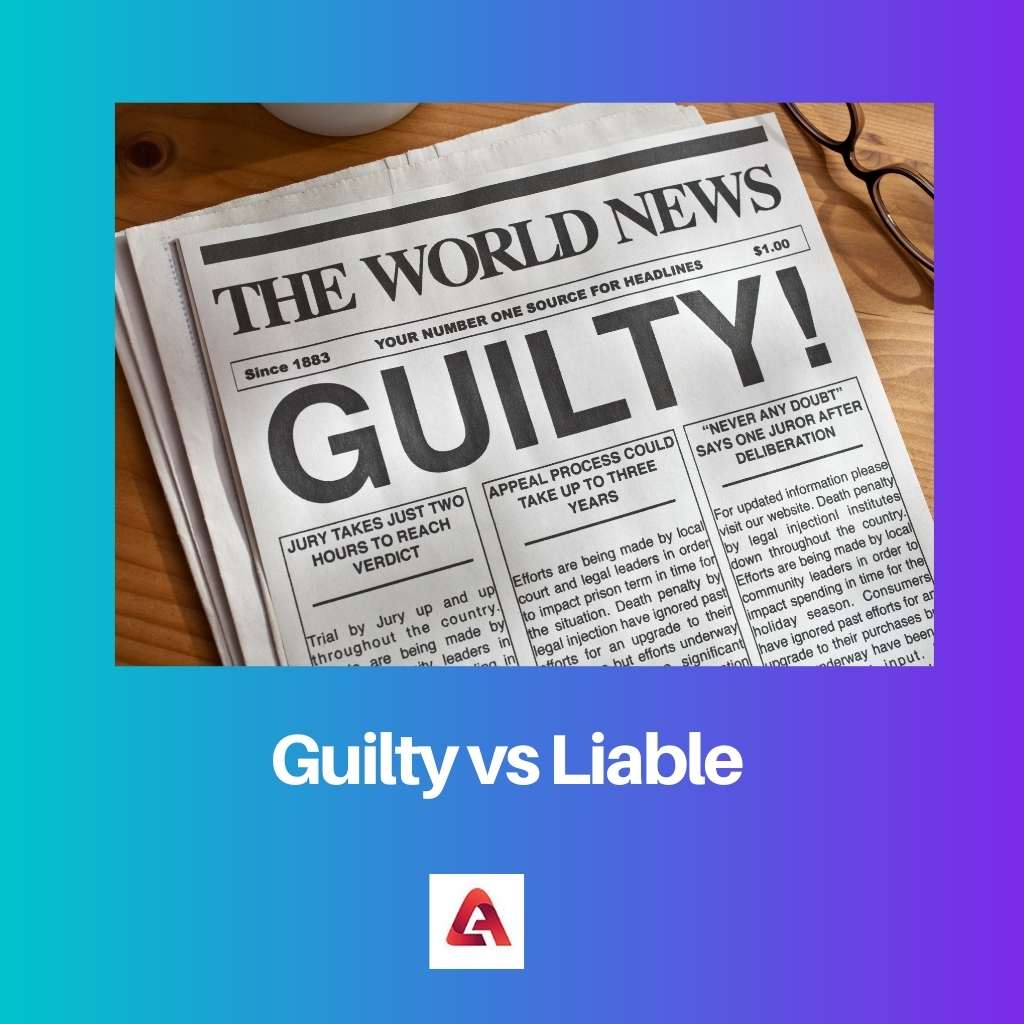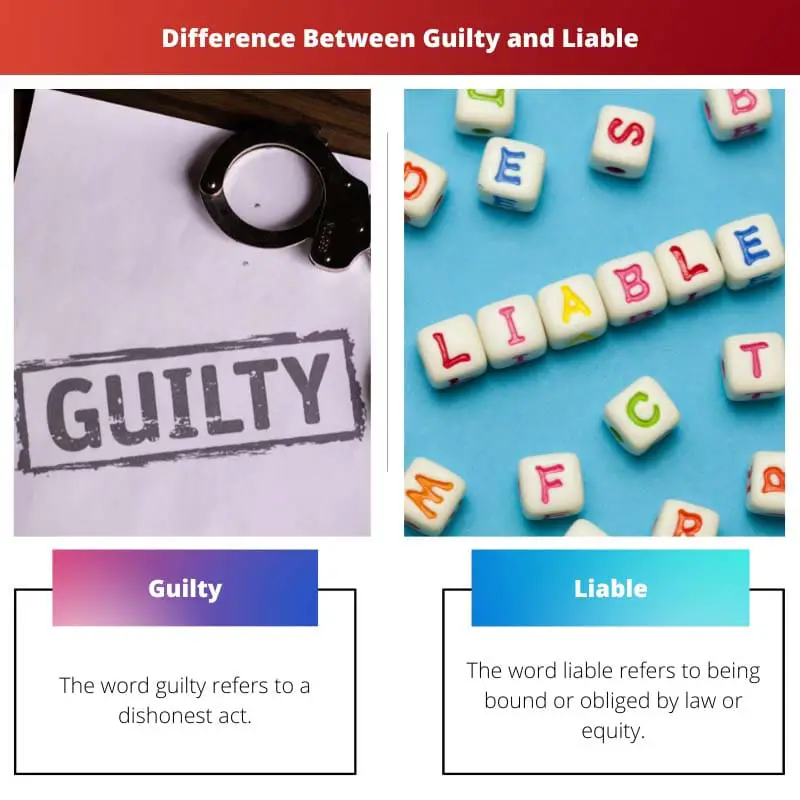There are several confusing terminologies in the English language. Such words appear extraordinarily alike to one another.
However, in reality, they have stark differences. The words guilty and liable are one such pair of confusing words.
While both words are adjectives and have practical applications in a legal sense, they vary from each other in meaning and uses.
Key Takeaways
- Guilty refers to being responsible for committing an offense, while liable means being legally responsible for something, such as a debt or obligation.
- The burden of proof is higher for guilty than for liable, as one must prove guilt beyond a reasonable doubt, while liable only requires a preponderance of the evidence.
- Guilty is used in criminal cases, whereas liable is used in civil cases.
Guilty vs Liable
Guilty is a word that refers to a finding of criminal responsibility for a particular act or offence. Liability, on the other hand, refers to civil responsibility for damages or losses suffered by someone else. Guilt relates to criminal law, while liability relates to civil law.

The word guilty means responsible for specified wrongdoing. For instance, Albert was found guilty of manslaughter.
The word guilty may also mean conscious of or affected by a feeling of guilt. For example, Lily felt guilty about the way she treated her husband.
The word liable means legally answerable or responsible. For instance, the communications company is liable for any breach of contract.
The word liable may also mean likely to do or to be something. For example, children can get sick if they don’t maintain their hygiene.
There are several interpretations of the word liable.
Comparison Table
| Parameters of Comparison | Guilty | Liable |
|---|---|---|
| Meaning | The word guilty refers to a dishonest act. | The word liable refers to being bound or obliged by law or equity. |
| Origin | The word liable originates from the French word lier, meaning to bind, and the Latin word ligare. | The word guilty was in everyday use even before the year 1000. |
| Year of Use | The word liable came into use from 1600 onwards. | The word liable came into use from the 1600 onwards. |
| Synonyms | Synonyms of guilty are shamefaced, illicit, felonious, nefarious, culpable, accusable, and chargeable. | Some synonyms of liable are accountable, answerable, susceptible, vulnerable, and sensitive. |
| Antonyms | Antonyms of guilty are moral, truthful, sinless, and innocent. | Some antonyms of liable are unaccountable, insusceptible, unexposed, and invulnerable. |
What is Guilty?
By definition, guilty means justly chargeable with or responsible for a grave breach of conduct or a crime. For example, Jonathan pleaded guilty to murder, and Raven is guilty of lying to his school teacher.
When an individual is found guilty, the jury has officially decided that he has committed a crime.
The word guilty also refers to suggesting or involving guilt. For example, the children exchanged guilty looks upon being scolded by the teacher for talking.
In addition, guilty may refer to a sense of blameful feeling in an individual. For instance, Rob felt guilty for helping Shanice with her term examinations.
The word guilty serves as an adjective and an adverb.
The synonyms of guilty are ashamed, shamed, shamefaced, illicit, felonious, nefarious, culpable, accusable, remorseful, sorry, convertible, and chargeable. In contrast, some antonyms for guilty are moral, truthful, sinless, innocent, and immune.
The word guilty came into use even before the advent of the 12th century.
Some phrases, including guilty, are as guilty as sin and guilty as charged. The word guilty originates from the Old English word gylt, meaning offence.
While guiltily is an adverb, guiltiness is a noun. The comparative and superlative degree of the word guilty is guiltier and guiltiest.
In the legal sense, the opposite of guilty is innocent. To conclude, the word guilty has several connotations.

What is Liable?
By definition, the word liable means obligated according to law or equity. For instance, Peter Thompsons was responsible for the debts incurred by his wife.
Another example is the transportation company is liable for any breach of contract. Another meaning of sensitive is subject to appropriation or attachment.
For example, Michael is liable to pay his pending taxes to the Government.
The word liable may connote being in a position to incur something. For instance, every individual who breaks the traffic light rules is responsible to pay a fine, or patients are sensitive to faint if they stand up too suddenly.
Some synonyms of liable are accountable, answerable, responsible, subject to, susceptible, vulnerable, sensitive, and open.
Some antonyms of liable are exempt, unaccountable, insusceptible, unexposed, and invulnerable. The word liable came into extensive use from the 15th century onwards.
Liability may also refer to a situation where one is likely to meet with harm. For instance, Uncle Jack is responsible to get malaria because of his dirty surroundings.
The word liable originates from the French word lier, meaning to bind, and the Latin word ligare. A less known translation of susceptible may be towards representing likely or apt.
Thus, the word liable serves several different meanings.
Main Differences Between Guilty and Liable
- While the word guilty means legally judged an offender, the word liable means legally obligated or accountable.
- Legally, an individual can be held guilty in a lawsuit, even though he may not be found guilty of the crime committed.
- A general meaning of the word guilty is feeling bad for wrongdoing. In contrast, an alternative definition of liable is susceptible to or exposed.
- In a legal sense, the word guilty is used concerning criminal cases. In contrast, the word liable is used concerning civil cases.
- An example of the word guilty in a sentence is Emily was guilty of cheating on her partner. An example of the word liable in a sentence is people who disobey the government laws are liable to be punished.




